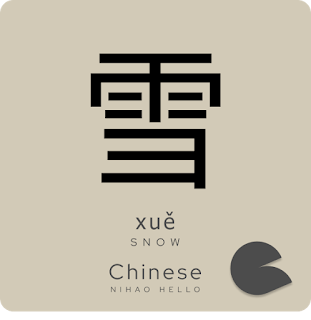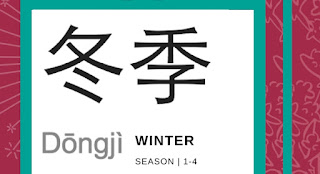- 雪
- 天空中飘落的白色结晶体,多为六角形,是天空中的水蒸气冷至摄氏零度以下凝结而成:
- 雪花。雪山。雪中送炭(喻在别人遇到困难时及时给予帮助)。
- 洗去,除去:报仇雪恨。为国雪耻。平反昭雪。
- 擦拭:“晏子独笑于旁,公雪涕而顾晏子”。
- 雪 = snow
冬季
Dōngjì
Winter is the coldest season of the year in polar and temperate climates, between autumn and spring. Winter is caused by the axis of the Earth in that hemisphere being oriented away from the Sun. Different cultures define different dates as the start of winter, and some use a definition based on weather. When it is winter in the Northern Hemisphere, it is summer in the Southern Hemisphere, and vice versa. In many regions, winter is associated with snow and freezing temperatures.
The moment of winter solstice is when the sun's elevation with respect to the North or South Pole is at its most negative value (that is, the sun is at its farthest below the horizon as measured from the pole), meaning this day will have the shortest day and the longest night. The earliest sunset and latest sunrise dates outside the polar regions differ from the date of the winter solstice, however, and these depend on latitude, due to the variation in the solar day throughout the year caused by the Earth's elliptical orbit (see earliest and latest sunrise and sunset).
The moment of winter solstice is when the sun's elevation with respect to the North or South Pole is at its most negative value (that is, the sun is at its farthest below the horizon as measured from the pole), meaning this day will have the shortest day and the longest night. The earliest sunset and latest sunrise dates outside the polar regions differ from the date of the winter solstice, however, and these depend on latitude, due to the variation in the solar day throughout the year caused by the Earth's elliptical orbit (see earliest and latest sunrise and sunset).









